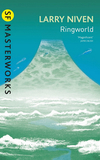
Ringworld is a pretty much the poster child for the hard science fiction ‘big dumb object’ novel. In that way, it’s very similar to the first of the Rama series (actually published 3 years later; ). It’s light on plot and characterization, instead opting to spend much of the novel on the titular Ringworld itself.
The technology of the Ringworld itself is interesting, although a decent amount of exactly how it works and its long history are left out. Essentially, take all of the planets and other objects in several solar system and turn them into a ring roughly 1 AU in radius. Spin it fast enough that you get fake gravity by way of centrifugal motion, add overhead plates to block sunlight into a fake day/night cycle, and add some plants. Bam Ringworld.
Plotwise, we basically have an alien with an experimental super-fast hyperdrive recruit a crew of three dubiously qualified others then set off to the Ringworld. They crash and spend a while exploring towards the rim of the Ringworld (it’s a million miles across…), find various remnants of civilization, and then head back. We never actually learn much about who built it or what happened to them.
Writingwise, the prose isn’t great and the dialog doesn’t feel at all natural. It’s readable, but you can tell this novel is primarily intended as a vehicle for ideas rather than something more modern to be read for the characterization and story.
Characterwise, we really only mainly have the four crewmembers sent to the Ringworld:
Nessus is a puppeteer. Basically, they’re a very old species which have done some crazy solar system level engineering but are extremely risk averse. The entire plot kicks off because they are worried about explosions in the core of the galaxy which will reach us in twenty thousand years. Nessus himself is considered a bit crazy in that he actually takes some risks.
Louis Wu is two hundred years old, although he doesn’t really feel it. He’s got a scientific mind and sometimes goes stir crazy and flies off into the stars. I’m not entirely sure he has much characterization beyond that.
Speaker-to-Animals is the other alien, from some sort of warrior race which tried to kill humanity several times in the past but has mostly given up on it. He’s actually fairly interesting, mostly as a counter to Nessus.
Teela Brown is the other human crewmemeber. She’s a twenty-something that’s lucky (that’s actually a weirdly large plot point, see below) and woefully inexperienced for something like this. Other than the luck, the only reason she seems to be about is to have someone for Louis to have sex with? Towards the end of the book (when Louis has found a new sex target), this happens:
“He got very uncomfortable and stopped sleeping with me. He thinks you own me, Louis.”
“Slavery?”
“Slavery for women, I think. You’ll tell him you don’t own me, won’t you?
Louis felt pain in his throat. “It might save explanations if I just sold you to him. If that’s what you want.”
“You’re right. And it is.”
So… yeah.
Speaking of luck:
One of the entire plot points of the book is that Nessus' race was apparently engaged in some very long term behind the scenes breeding programs. They bred Speaker-to-Animals' race to be less aggressive, which is probably not a terrible idea, but I get why Speaker-to-Animals is pissed about it. For the humans, they instead instituted a lottery for the right to have children. After several generations, this is supposed to have bred 'luckiness' into mankind, of which Teela is apparently the luckiest. It's a really weird, psuedo- sciencey plot point and takes up an unusually large amount of the book.Bleh.
Anyways, if you enjoyed Rama or other ‘big dumb object’ books, you’ll probably also like this (I actually liked Rama a bit more). If not, perhaps give it a pass? Reading summaries of the sequels, I think I will give them a pass, at least for right now.